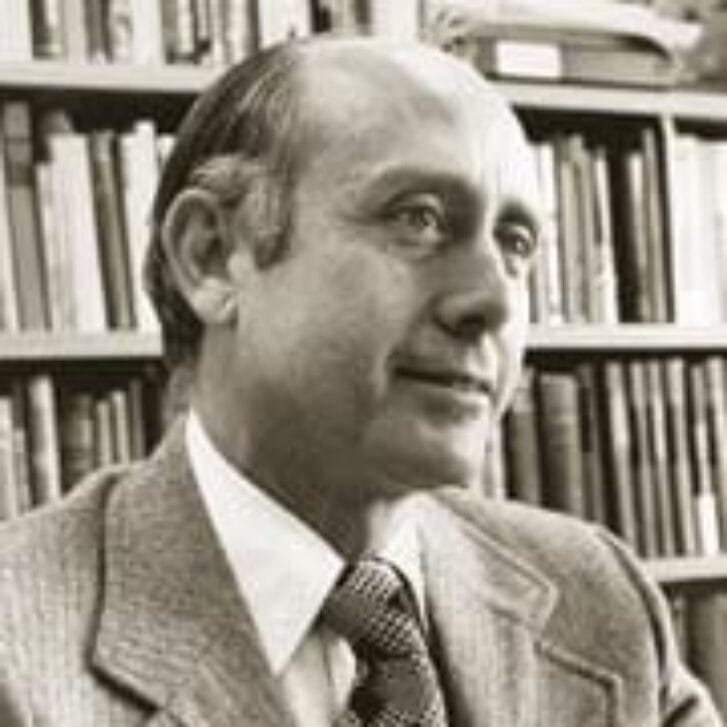Wharton Global Alumni Forums Draw Record Attendance, 2006 Forums to Kick Off With January Event in India
During summer 2005, 681 Wharton alumni, spouses, and guests enjoyed dinner at the home of the president of Singapore. In London, current and former board members from Europe announced a $1 million donation to support the school’s Corporate Social Responsibility Initiative. And in Santiago, Roberto Canessa, a survivor of the 1970s Andes plane crash, described in chilling detail the role of leadership in “extreme situations.” The venue for these disparate events? Wharton Global Alumni Forums.
As Wharton’s alumni base becomes more and more international, Wharton Global Alumni Forums have increased in both impact and popularity. Held in three different locations each year, the annual events have become a venue where long-term connections are both forged and renewed, alumni gain inspiration and insight, and critical business is being conducted.
In 2005, the Forums attracted 1,300 participants, a record number, according to Jeffrey A. Sheehan, Associate Dean for International Relations, whose office oversees the Forums. “Many of the alumni now go to all of the Forums, or at least as many as they can attend,” said Sheehan. “This is really gratifying and shows how valuable the Forums are to our global alumni.”
Begun in 1993 to better connect alumni around the world to Wharton and now entering their 14th consecutive year, the Wharton Global Alumni Forums initially were small gatherings. Now the Forums themselves have become significant events—each a unique experience with customized programs and panels that attract alumni, regional political and business leaders, and Wharton faculty and administrators.
The 2006 Forums will be in Mumbai (January 6-7), Istanbul (June 8-9), and Rio de Janeiro (July 13-14). Dr. Manmohan Singh, the Prime Minister of India, is expected to speak at the Mumbai Forum. Among the Wharton faculty scheduled to attend are Jeremy J. Siegel, Russell E. Palmer Professor of Finance, and Michael Useem, William and Jacalyn Egan Professor of Management, who will speak on leadership. Harbir Singh, Mack Professor of Management, and Jitendra V. Singh, Saul Steinberg Professor of Management, will also speak at the Mumbai Forum. Sheehan says that the alumni organizing committees in each country deserve credit for the growth of the Forums, choosing as they do exciting and up-to-the-minute programs for each Forum. Finally, he said, the Forums give Wharton figures and, as in Singapore and Mumbai, world figures an opportunity to speak about the global economy and international business practices.
He noted especially the participation of Prime Minister Singh in the upcoming Mumbai Forum and a speech by former Singaporean Prime Minister Goh Chok Tong at the Forum in his country. Visit <http://www.wharton.upenn.edu/alumni/ forums> to register for the 2006 Global Alumni Forums.
Editor’s Note: Get Ready to Celebrate
This issue of the Wharton Alumni Magazine highlights the School’s far-reaching influence by profiling a few of the many Wharton alumni who are educating business leaders around the world. We also take a look at Wharton’s Center for Human Resources, which was founded as the Industrial Research Department in 1921 and has impacted some of the most controversial management issues facing U.S. industry — from union relations to affirmative action.These features are part of our coverage of the upcoming 125th anniversary of Wharton’s founding. The Wharton School began in 1881 as the world’s first collegiate business school, and for 125 years it’s been a hub for business education.
Business has become the engine that drives economic growth, improves quality of life, fosters global exchange, and creates opportunity around the world. Today more than a thousand colleges and universities around the world offer business majors. One-quarter of all undergraduate degrees in the U.S. are awarded in business. And Wharton continues to remain distinctive among business schools worldwide.
In upcoming editions of this Magazine, you’ll be invited to participate in a yearlong 125th anniversary celebration that will begin with the Global Alumni Forum in Mumbai on January 6-7, 2006, and continue in 20 cities around the world. You’ll read more about what how Wharton faculty and alumni have had—and continue to have—an impact on business education and practice throughout the world. The upcoming 125th anniversary of Wharton’s founding doesn’t just represent a milestone for the school—it’s a milestone for management education and for business itself. And that’s an occasion worth celebrating.
MBA Admissions Expands Worldwide Receptions, Invites Alumni Participation
For the 2005-2006 admissions cycle, MBA Admissions representatives are increasing their travel schedule to hold 81 admissions events in 40 cities. These events build on the success of last year’s aggressive international travel schedule, which helped Wharton welcome one of its strongest classes at a time when most business schools experienced a decline in applications. To contrast, Wharton applications were slightly up (0.5% to 5,654 applications for 800 spots) and the entering class averaged an impressive 714 GMAT and 3.5 GPA, with 63 countries represented.
MBA Admissions Director Thomas Caleel, C’94, WG’03, gives part of the credit to Wharton’s worldwide receptions, and encourages alumni to attend this year’s events. Says Caleel, “When we survey our matriculated students, 80 percent of them say that contact with an alumnus is a deciding factor in their decision to apply to and attend Wharton. Alumni are absolutely critical at these receptions.”
In addition with meeting with Wharton admissions representatives and alumni at receptions, applicants can also interview locally with one of more than 1,500 alumni interviewers worldwide. Caleel says that his team has a mandate to hit the ground in as many communities as possible to get the word out. “I believe that we’re in the people business, and the best way to promote that is to let candidates see and hear from us,” he says.
“If you see a high-potential candidate, give them a tap on the shoulder and let them know what the Wharton MBA is about.” To find out about MBA Admissions events near you or to learn how to become an alumni interviewer, visit the Wharton MBA Admissions site at http://mba.wharton.upenn.edu.
Wharton Kicks Off Corporate Social Responsibility Initiative, European Alumni Give $1 Million for Business Ethics Programs
With Enron, Tyco, Martha Stewart, and other business scandals in the news, corporate social responsibility has become one of the most urgent topics in international business. To help Wharton lead the way in this crucial field, a group of European alumni recently made a $1 million gift to fund a European Corporate Social Responsibility (CSR) initiative.
This endowment will support research on corporate ethics and responsible investment, primarily in Europe and the United States, as well as two PhD fellowships (at least one for a resident of the European Community) and an upcoming transatlantic conference on corporate social responsibility and ethics. The gift was presented to Dean Patrick Harker on June 10, 2005, at Wharton’s Global Alumni Forum in London, by current and former members of the Wharton Executive Board for Europe, Africa, and the Middle East.
This alumni gift represents a significant step in the School’s effort to develop research, initiate programs, and train professors in corporate social responsibility and business ethics. As a prominent reflection of this commitment, Wharton’s department of Legal Studies has officially changed its name to Legal Studies & Business Ethics.
Legal Studies & Business Ethics Professor Thomas Donaldson, Mark O. Winkelman Professor and director of Wharton’s PhD program in Ethics and Law, has been the “intellectual locomotive” behind the CSR Initiative, in the words of Michael Fisher, WG’74, one of the gift’s alumni leaders.
“In order for ethics and corporate social responsibility to receive the attention they deserve in business schools,” argues Donaldson, a longtime scholar of business ethics, “research and teaching about them must reflect rigorous, systematic methods.” The CSR Initiative arose from a feeling among European alumni leaders that Wharton’s unique combination of business strength and academic research could move this topic forward on the international business agenda.
The gift’s primary architects—Fisher; Felipe Oriol, WG’74; and Henry Sweetbaum, W’59, initiated discussions about corporate social responsibility with Dean Harker at the 2003 Global Alumni Forum in Berlin. Following those conversations, they brought together a larger group of European alumni, centered on the Executive Board for Europe, Africa, and the Middle East, including Stephen Barclay, WG’67; Guy Detrilles, WG’71; Sir Paul Judge, WG’73; Wolfram Nolte, WG’77; Jean-Pierre Rosso, WG’67; Jacob Wallenberg, W’80, WG’81; and Klaus Zumwinkel, WG’71.
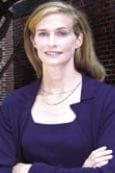
Anne Sullivan
In August 2005, Anne Rollow Sullivan became Wharton’s new senior associate dean for finance and administration. Charged with overseeing the School’s $250 million annual budget, human resources, computing, and facilities, Sullivan is pleased to become a part of the School’s long tradition.
“I am thrilled to be here at Wharton,” she says. “My work here to ensure the financial health of the School and the effectiveness of its operations is a means to a more important end—the support of teaching and research.” Sullivan joins Wharton from Columbia University, where she spent two years as assistant vice president for administrative planning and financial management.
In this role, she led initiatives to improve financial reporting and controls for the university, including project management of the redesign and implementation of a new budget process across the university’s 300 budget units, enhancements of financial operations at the medical center, and an analysis of cash-management opportunities for the treasury function.
In addition to furthering Wharton’s mission, Sullivan is continuing her own family tradition. Her father and brother are both Penn undergraduate alumni, and her mother, Heather Murphy (then known as Heather Rollow), WG’80, graduated from Wharton’s MBA program when Sullivan was in elementary school. “I remember her calling just before a finance exam to check up on me when I was home sick from school,” she says. “She has been a terrific role model.”
Her mother’s dedication impressed her daughter with the importance of education. Sullivan has a bachelor’s degree from the University of Virginia, where she was an Echols Scholar and graduated Phi Beta Kappa. She worked in corporate finance in investment banking in New York and San Francisco, and then as a lead consultant in the financial services and health care practice unit of Booz Allen Hamilton. She then completed a master’s degree in public policy from the John F. Kennedy School of Government and a MBA from Harvard Business School.
Since graduating, she has remained within the higher education realm. Prior to her appointment at Columbia, Sullivan was vice president for strategic development and marketing for the Fathom Knowledge Network, a Columbia-owned venture that disseminated research and teaching of 13 institutions. Sullivan’s professional experience as a senior manager in both academic and corporate settings enables her to bring skills in financial analysis, strategy and business development to her new role at Wharton.
“The complexity of management within higher education is what makes this position interesting and gratifying,” she says. “I feel fortunate to have the help of such a talented team in Finance and Administration. I am looking forward to working with faculty and the administration to determine how we can play a positive role in the next phase of development for the School.”
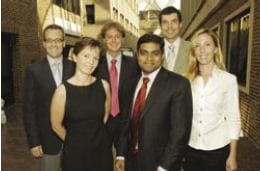
McAuliffe, O’Sullivan, Cassat, Iyengar, Hail, and Mueller
Could the U.S. semiconductor industry have taken off without a strong stock market? Does the cost of your cell phone plan affect how much you use it? How can emotional intelligence affect your performance in the workplace? These are just some of the research questions pursued by Wharton’s six new faculty members, whose work ranges from international corporate governance to comparative genomics to entrepreneurial financing.
The Management Department welcomes Associate Professor Mary O’Sullivan, one of the leading global experts on how corporations interact with their shareholders and stakeholders. O’Sullivan studies corporate governance from a comparative, international viewpoint. “I’m interested in differences in institutions and differences across countries,” she explains, “and how that affects how people perform economic activity.”
She has put these international principles into play in her own life: Born in Ireland, she earned an MBA and PhD at Harvard; taught for eight years at INSEAD in Fontainebleau, France; and came to Wharton last year as a visiting associate professor as part of Wharton’s ongoing Alliance with INSEAD.
Wharton and Penn, she says, are the perfect home for her cross-cultural, interdisciplinary research, which draws on political science, economic history, and business history. Her work focuses especially on how shareholders and stakeholders influence (or fail to influence) corporate activity—and how those relationships can evolve over time.
O’Sullivan tracks these interactions through case studies that start with a firm and an industry, then widen to include the society around them—an emphasis on real-world businesses that she attributes to having an MBA in addition to a PhD. She first used this method in her book, Contests for Corporate Control (Oxford University Press, 2000), which examined corporate governance and economic performance in the U.S. and Germany. This semester Wharton also welcomes five new assistant professors whose specialties range from science to banking and finance to marketing plans and workplace emotions.
In the Statistics Department, Jon McAuliffe brings to Wharton a state-of-the-art focus on comparative genomics and bioinformatics. McAuliffe has a PhD in Statistics from the University of California at Berkeley. The Accounting Department adds specialists in venture financing and international banking. Gavin Cassar, an Australian scholar who received his PhD from Berkeley, specializes in financing and opportunity costs for start-ups, small firms, and entrepreneurial ventures, as well as in empirical financial accounting. Luzi Hail is an expert in international capital markets with a doctoral degree from the University of Zurich. A visiting scholar at Wharton since 2004, he previously taught at the University of Washington in Seattle. Jennifer S. Mueller joins Mary O’Sullivan as a new faculty member in management. Mueller specializes in the role of emotions in the workplace, including emotional intelligence in negotiations, patterns of emotional expressivity in work other consumer-related topics, including the use of data by breakfast food and table syrup companies to predict how consumers will behave.
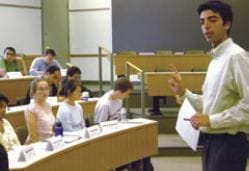
Tarek Mansour, WG’03, right
‘Emotional Intelligence’ Leadership Training Offered During MBA Pre-Term Through McKinsey
“Know thyself. It comes down to the Greeks,” said Zafer Achi, a McKinsey director and the manager of the consulting firm’s Montreal office.
Standing before 30 first year MBA students in Jon M. Huntsman Hall on a Friday in August, Achi was describing the concept of self-awareness. The precept, once engraved on the temple of the Delphic oracle, is now considered one component of emotional intelligence—which itself is one of three characteristics of a great leader.
Most McKinsey events on the Wharton campus are populated by students in sharply tailored gray suits, but the class seated in Huntsman Hall was relaxed in slightly rumpled shorts and T-shirts. But this was no recruiting session—it was a new leadership training offered by the Wharton Graduate Leadership Program. The students didn’t dress to impress—they wore the unofficial uniform of Pre-Term while attending an optional class delivered on a typically hot and sticky Philadelphia summer day. Titled “Performance Leadership,” the session came about through collaboration between Wharton and a recent alumnus, Tarek Mansour, WG’03.
Mansour, a McKinsey associate based in Montreal, had experienced his firm’s success in coaching peak performance through a three-pronged approach incorporating IQ (intelligence quotient), EQ (emotional intelligence quotient), and MQ (meaning quotient). The training itself had been developed as an outcome of McKinsey’s work with an Australian call center.
A McKinsey consulting team had used techniques of performance leadership to change the company culture, reducing turnover from 50% to 20% annually. By implementing its massive client database, McKinsey identified measurable factors that contribute to a healthy corporate culture, and began working with internal teams and clients to put them to work.
Mansour experienced the success of the program, and he thought that Wharton students would benefit. Mansour contacted Evan Wittenberg, WG’02, Director of the Wharton Graduate Leadership Program. The two worked to bring the McKinsey program to campus during Pre-Term. Achi, Mansour, and Tamara Paton, WG’04, a McKinsey associate based in Toronto, delivered the interactive training before two groups of 30 in morning and afternoon sessions. Because recruiting is not allowed during the five week period before classes begin, the event was not advertised as a McKinsey sponsored training event.
“We wanted to make sure students came only because they were interested in leadership,” said Mansour. “Pre-Term is the right time because the people here will be leaders in the school, and this will help them get the most out of their two years at Wharton.”
Two MBA Exec Students Sell Businesses First Term at Wharton West
Christopher Pitzak, WG’07, was enjoying a career as an international professional volleyball player in 2000 when his season ended in Finland. He had to fill in a few months while his wife finished her teaching job. Many of the kids in the school where his wife was teaching were offspring of parents working at Nokia and other firms in the burgeoning Finnish telecommunications industry.
“Ringtones and graphics were just taking off for mobile phones,” said the former Brigham Young University volleyball player, whose team won the NCAA championship in 1999. “I pretty much fell into the business and learned all along the way.”
Pitzak, 30, is still learning at Wharton West, where he came this spring after selling the ringtone and cell-phone wallpaper business he started as a spin-off from that first job at Jippii (cq), a Finnish mobile-phone entertainment company. Another of Pitzak’s MBA classmates, Kitri Patel, WG’07, is in a similar position. Patel this June sold Sensant, the medical ultrasound business he founded in the late 1990s Silicon Valley tech boom, to Siemens.
While there’s nothing unusual about MBA students with entrepreneurial aspirations, Christopher Pitzak and Kitri Patel had already built their ideas into prospering businesses when they applied to the Wharton MBA Program for Executives. As first-year students at Wharton West, each is using his education to prepare for the next career step. Both Pitzak and Patel still work on contract for the companies that bought their businesses and are using their newfound positions to refresh, reflect, and gain the business skills they need in their new roles.
“You can look at what I did, starting a spin-off and then getting it sold, and say I have been a success,” said Pitzak. “But I don’t really think there can be a substitute for experience or education—I think you need both. I look at what I have done and if I had this knowledge I am getting from Wharton five years ago, I would have done things a lot better and had a more successful outcome. If I really understand the fundamentals about business and learn from the best instructors, I am going to be able to do the next thing at a higher level.”
Patel, who is 40, looks at his classes similarly. His first semester at Wharton in San Francisco, he took accounting, basic economics, and a course on managing people. “The concepts themselves may not be new to me, but having case studies and people talking about them in class, it sheds a new light on them,” said Patel.
Pitzak grew up in San Clemente in Southern California, and was happy to return to his native state when Jippii sent him there to found Jippii USA. He ended up finding Korean buyers for the company, which he had renamed Downplay, and will continue to help run the company at least through part of his Wharton stay. Patel got interested in starting his own company soon after he started work on a master’s in electrical engineering at Stanford in the mid-1990s.
“It is part of the culture there. Everyone seems to come to campus with the idea of starting a company, so I met some friends with a like mind,” he said. But first he went to work at Intel, where he learned about semi-conductors, which are integral to the complex ultrasound equipment Sensant as an independent company, and now as part of Siemens, makes.
Now, at Wharton West, Patel wants to learn what, in general, makes young companies tick. He is under contract to work for Siemens and hopes that large corporations will eventually send him off to work on companies with nascent technology which need someone with his hands-on skills. Mostly, Patel said, he enjoys the opportunity to meet one on one with Wharton professors and alumni contacts to discuss business ideas.
Update to “Record MBA Class Pledge Creates a Legacy,”Summer 2005: The Wharton MBA Program for Executives has now achieved 100% participation in the class gift for the second year in a row! In addition to the traditional MBA challenge donors, two alumni made challenge grants for the MBA Exec class. Scott Wieler and Ray Silcock, both WG’87, each gave $50,000, for an additional total of $100,000, and the East and West classes together pledged $304,983. The MBA Exec co-chairs are Stephen Shueh, Andrea Kirk for the East and Greg Chow and Michael Ashburn, for the West (all WG’05).
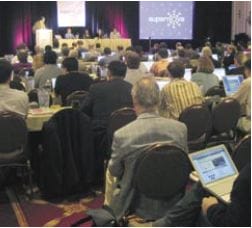
The Supernova Conference in San Francisco
Is the current high-tech recovery sustainable? Is it the same as the earlier bubble in the technology industry, or is it a genuinely new phase? On June 20-22, at the Supernova Conference held at the Wharton West campus, over 300 leaders of the high technology industry came together to create and debate their industry’s newest ideas. The Supernova conference, founded in 2002 by Wharton Assistant Professor of Legal Studies and Business Ethics Kevin Werbach, has become a key annual event for high-tech innovators, thinkers, and business leaders.
In Werbach’s words, the conference “strives to bring together people and ideas at the bleeding edge with more practical and established business realities—people who have shared interests but are not going to run into each other anywhere else.”
His plan seems to be working. This year’s diverse speakers ranged from executives of Google, Microsoft, Yahoo!, Sony, IBM, and Sun Microsystems, to innovators in such areas as podcasting, social networking, buzz marketing, and open source software. Participatory tools—such as weblogs, search engines, file- and photosharing, and online gaming—define much of the future for high-tech applications.
Online games, Werbach and panelists suggested, are an increasingly central paradigm, even for those who neither make nor play them. With more revenue than the Hollywood film industry, they now push the leading edge of technology faster than any other form. Many users now buy new PCs only to have upgrades for online games.
Online games also provide a model for other forms of collaboration, from the military to “flash mobs” —in which large numbers of people organize online, meet in person, then quickly disperse—to such business applications as a new call center built around a three dimensional interface with virtual avatars.
For Werbach, the ongoing tech recovery echoes the founding of Supernova after the tech bubble burst in 2002. He believed at the time that innovation was as vital as ever—it just wasn’t getting funded. In fact, “there was more freedom in innovation because there was no rush to market.” In that environment, he decided to bring together “interesting, diverse, engaging people in a forward-looking way,” in a new context untainted by the bubble.
Planned and executed in only five months, that first Supernova session helped people in the high-tech industry feel like the lowest point had passed. “This is the first time I’ve been optimistic again since the crash,” Werbach remembers someone telling him at the time.
This is the first year that Wharton sponsored the conference, adding a day of Wharton West Workshops, at which leading innovators and experts offered handson exposure to the latest business tools and trends, along with interactive seminars targeted to business professionals and technology strategists.
Looking forward to next year’s conference, Werbach can’t predict what trends will emerge over the next year: “I start over every year because the world changes.”
Yet he knows that he will pursue Supernova’s longterm goal: creating more and more dialogue between high-tech innovators and established businesses, who need to “see the value of this kind of interaction with people and ideas at the bleeding edge.























